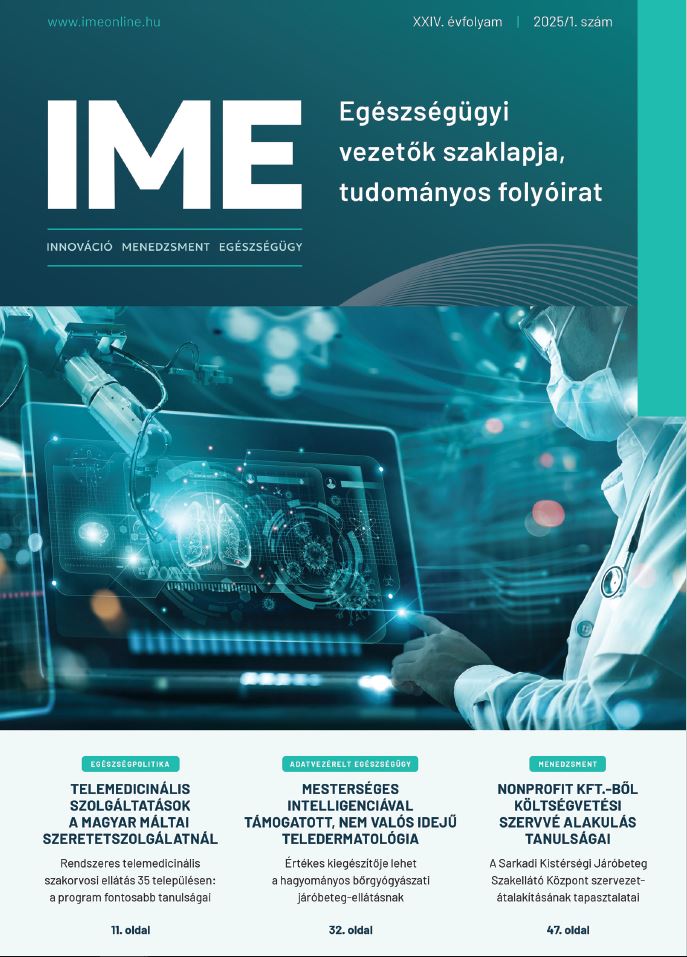Teleszakorvosi szolgáltatások bevezetése a Magyar Máltai Szeretetszolgálat telemedicinális programjába
Absztrakt
A hátrányos helyzetű településeken élő lakosok egészségügyi ellátáshoz való jutása gyakran nehézségekbe ütközik a nagyszámú betöltetlen háziorvosi praxis eredményeként kialakuló ellátási hiány, az alacsony egészségtudatosság, valamint a fizikai távolság és egyéb akadályok miatt nehezen elérhető szakrendelők miatt. A Magyar Máltai Szeretetszolgálat 2022 őszén indította el a Naszlady Attila Egészségfejlesztési Programot (Program) abból a célból, hogy hozzájáruljon a hátrányos helyzetű településeken élő lakosok egészségügyi ellátáshoz való jutásához.
Jelen tanulmány célja a Program során igénybe vett leggyakoribb, szakellátás irányába tett beutalások és mintázatok (kardiológia, ultrahang, labor) azonosítása, egymást követő évek azonos időszakaiban (2023. március-május és 2024. március-május). További célként tűztük ki a telemedicinálisan támogatott egészségügyi tevékenységek portfóliójának megvalósítási folyamatának bemutatását, valamint az új típusú ellátási forma – a mobil, virtuális teleszakorvosi ellátás – kezdeti gyakorlati tapasztalatainak, ellátási kapacitásának és a Program fontosabb tanulságainak ismertetését.
2024 júliusában 35 településen biztosított a Program rendszeres, telemedicinális egészségügyi ellátást, közel 40 000 páciens egészségügyi ellátását támogatva. A 2023 márciusában indított Programban egy virtuális szakorvosi rendelő került kialakításra, amelyben teleszakorvosok (kardiológus, bőrgyógyász, pulmonológus és endokrinológus) segítik az alapvető diagnosztikai lehetőségek mellett az elsődleges ellátók, a háziorvosok és belgyógyászok tevékenységét, online és offline konzíliumok segítségével. Emellett két mobil ultrahang rendelőben elérhető ultrahang szakrendelés támogatja az ellátási folyamatot, a helyszínen elérhető labordiagnosztikai szolgáltatások mellett. A távkardiológus bevonásával felére csökkent a területi kardiológiai ellátás igénybevétele (11%-ról 5%-ra), az ultrahang-vizsgálatok pedig teljes mértékben kiválthatóvá váltak a mobil ultrahang rendelőben (5%-ról 0%-ra).
A teleszakorvosi rendszer implementálása az egészségügyi ellátásba jelentős hozzáadott értékkel bírhat a betegellátás minőségének javítása érdekében. Emellett hozzájárulhat a területi egyenlőtlenségekből adódó ellátási nehézségek mérsékléséhez, valamint a területi szakrendelők indokolatlan beutalásainak csökkentéséhez.
Kulcsszavak: mobil rendelő, telemedicina, virtuális konzultáció, hátrányos helyzetűek, távoli orvosi konzultáció, digitális egészségügy

This work is licensed under a Creative Commons Attribution-NonCommercial-NoDerivatives 4.0 International License.




